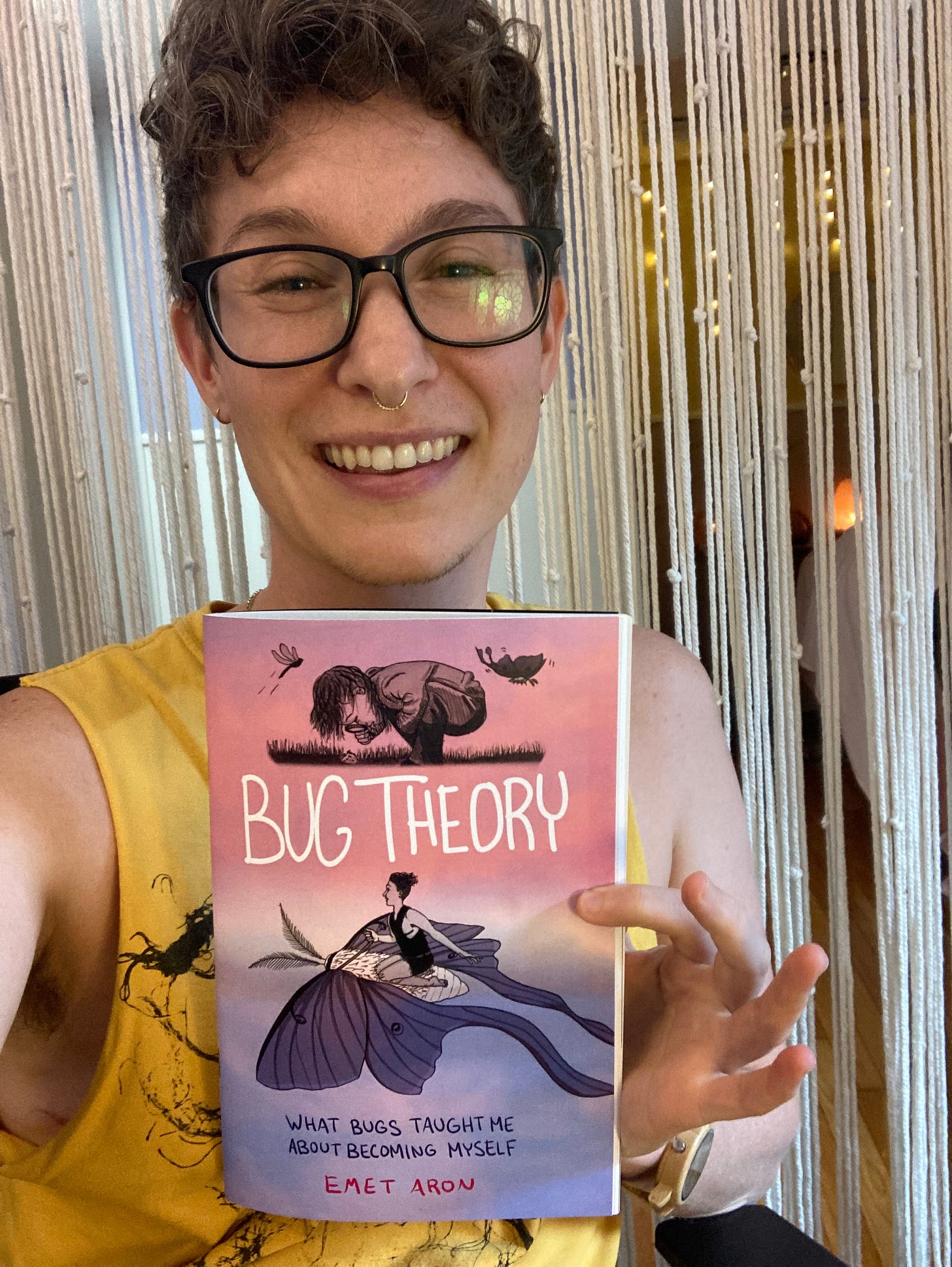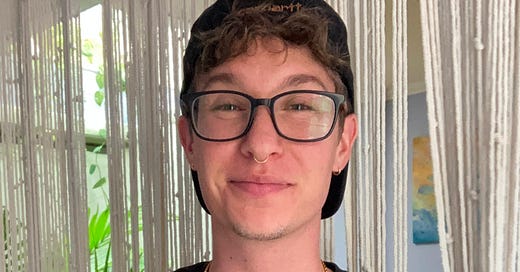Reading, Writing, & Resisting + Three Questions with Emet Aron
Finding joy, being well, and telling stories are fundamental to survival
Spring uplifts the spirit. Thank heavens for more birdsong and snowdrops that press their white bells up from the pressed earth. In Greenwich Village, people dressed in an array of colors and for all sorts of weather, pass under rows of dark pink blossoming cherry trees. Noticing spring makes me smile honestly and boosts my mood in spite of the daily rushes of scary and heartbreaking news. Finding joy and appreciating beauty in the face of oppression does double duty: it is an act of resistance in itself and it supports our capacity for staying informed and raising our voices.
Writing, reading, and telling stories can also be acts of resistance. The inherent activism in engaging with stories can be easily forgotten at times—but not right now. The dismantling of our public education system, banning of books, and hobbling of the free press puts the power of the dissemination of ideas into sharp focus. If these incubators of free thought weren’t a threat to the rise of fascism, then books, articles, and the people and institutions that write and share them wouldn’t be in the current government’s crosshairs.
This month I had the privilege of attending the Finalists’ Reading for the National Book Critic Circle Awards and the award ceremony itself. Both nights were a celebration of important, moving, inspiring, and brilliantly crafted books. A number of the passages read were about joy, hope, sadness, grief, and fortitude in the face of oppression. I have shared the winning titles in my regular column Until Next Time below.
In addition this month’s newsletter features another installment of Three Questions, a series that reclaims the concept of wellness from influencers and advertisers. This installment’s guest is Emet Aron, a trauma-informed and mindful massage therapist, artist, and author of Bug Theory: What Bugs Taught Me About Becoming Myself. We talk about wellness and also about the process of putting a vulnerable memoir into the world.
I hope you enjoy this edition Tender at the Desk and Stove. If you do, and have not already, please consider subscribing. If you are a subscriber, please consider sharing this always free newsletter with someone you know.
Three Questions with Emet Aron
Emet Aron (they/he) is an artist and a mindful, trauma-informed massage therapist and energy worker for all bodies (including mine!) based in Western MA. In this installment of Three Questions, Emet and I chat about the definition of wellness, how their work supports their clients’ wellness, and how they tended to their own wellness while creating and publishing an autobiographical graphic novel.
Laura: Part of my work is to reclaim the word "wellness" from marketing teams inside the beauty, diet, and fitness industries. As a trauma-informed massage therapist and energy worker, as well as an artist, I am curious how you would define wellness for yourself?
Emet: That's such a good question. To me, wellness means vibrant wellbeing. Some elements of wellbeing are a regulated nervous system, a robust community of support, a sense of purpose, wholeness and spiritual connection, and a satisfying creative life. I think that a sense of connection and belonging within the human and more-than-human world around us is an integral part of wellness (good luck trying to commodify that, capitalists!)
L: How does your approach to massage therapy support this definition of wellness?
E: The longer I practice massage (19 years!?), and the more I nerd out about polyvagal theory, the more I think that my primary job as a massage therapist is to assist the client in regulating their nervous system. I've found that safe, attuned touch is one of the most immediate and powerful ways to shift a fight/flight/freeze state (a mild form of which is common, and may be unnoticed by the client) into the calm and social state, where wellness/wellbeing can happen. Touch lets our animal self know that we are safe and connected.
I try to practice “listening touch”. This is a skill that grows out of palpation (touch for the purpose of assessing the health of the tissues). Receptive touch that is “reading” information can grow beyond noting places of tension and become a healing experience in and of itself, because the distress that's being held inside the client's body is being “seen”, acknowledged, and attended to on a pre-verbal level. This is often exactly what is needed for the system to come back into balance.

L: I want to give some time to your comic Bug Theory: What Bugs Taught Me About Becoming Myself which I loved! You dedicated it to all trans people and describe it as "part transition memoir and part love letter to bugs." It is a very personal work and the narrator—you— are vulnerable, generous, and kind. For all our writers and artists who are reading, can you share a bit about how you supported your own wellness as you created this comic and what it has been like for you to have put it out there in the world?
E: Thank you so much, Laura! One of the things that has supported me the most is meeting regularly with other creatives to reflect, nurture, and challenge each other to grow. I don't think I could have done this by myself. Also I shared from the scar, not from the wound (I started writing Bug Theory about a year after the events in the book had ended). It was also important for me to set clear goals about what I wanted to create, by when, and break it down into small pieces that I could focus on one week or one day at a time.
I took breaks—long breaks. In the middle I took about 9 months away from it, and when I came back, it was clear that that had really been needed. My approach to it was fresh, and free from a lot of the baggage that I'd been putting on it the first time around.
Putting it out into the world is pretty weird, I'll admit. It's easier if I don't think about what's in there too much while I'm running a booth at a comics fair or handing it over to an aquaintance. It is extremely vulnerable, but one of my mentors says “the personal is the universal”. These are things that everybody feels in some form, and it's thrilling for me to shine a light on them, especially the places that we have been taught to hide. It frees me from shame, and I hope that it does the same for the reader.
L: Thank you so much Emet! how can people learn more about your work as an artist and wellness practitioner? And of course, can interested folks get their own copy of Bug Theory? If so, how?
I have an instagram; @bug.theory.arts, although I'm working on moving away from Meta's platforms. My burgeoning Bluesky and Substack accounts are @dreamseedarts, and my seedling website is www.dreamseedarts.com. People can buy Bug Theory there. Thank you so much!
WATCH: I am all caught up on Hacks and looking forward to season 4. Hacks (Max) is a comedy about the seemingly unlikely team of boomer Las Vegas comedian Deborah Vance (Jean Smart) and Gen Z television writer Ava Daniels (Hannah Einbinder) who torpedoed her career with tweet. Even though Hacks is a comedy featuring grossly entitled characters and their at-times toxic relationships, I find it an oddly heartwarming and never saccharine. Over the first three seasons we see growth in many of the characters that feels realistic in that there is also a lot of backsliding into terrible habits along the way.
LISTEN: You Didn’t Hear This From Me. Until last month, I haven’t successfully listened to an audiobook since I listened to On The Road on CD during a road trip in 2001. Nearly a quarter century later I listened to
’s new book of essays on gossip and it’s different permutations, how it serves and undermines us, and the urge to and mechanics of how we do it while I drove between New York and Massachusetts. I am a huge fan of her podcast Normal Gossip and I associate her voice with entertaining storytelling so I gave it a whirl. McKinney’s exploration of gossip is thoroughly researched, delightful, engaging, and thought provoking. What other podcasters have books I might enjoy? Let me know by commenting
READ: The 2024 National Book Critic Circle Award winners. So normally I only recommend something that I have read, because that is how authentic recommendations generally work. But after having heard so many of the finalists and winners read excerpts from their work last week at the Finalists’ Reading, I encourage you to peruse these titles and pick one if sounds good to you!
Fiction: My Friends by Hasham Matar
Nonfiction: Challenger: A True Story of Heroism and Disaster on the Edge of Space by @Adam Higginbotham
Biography: Candy Darling: Dreamer, Icon, Superstar, by Cynthia Carr
Autobiography: Patriot: A Memoir, by Alexei Navalny, translation by Arch Tait with Stephen Dalziel
Poetry: Wrong Norma, by Anne Carson
Criticism: There’s Always This Year: On Basketball and Ascension, by
John Leonard Prize for First Books: Feeding Ghosts: A Graphic Memoir, by
Gregg Barrios Book in Translation: A Last Supper of Queer Apostles, by Pedro Lemebel, translation by Gwendolyn Harper











Thank you for reminding everyone that finding joy in what feels like very dark times is also an act of resistance.
Also, I hope that your readers find a book or two or more that they find interesting in the NBCC award winners or finalists. You already know that I'm partial to Tessa Hulls and Hanif Abdurraqib!
Thank you so much Laura!! 💚